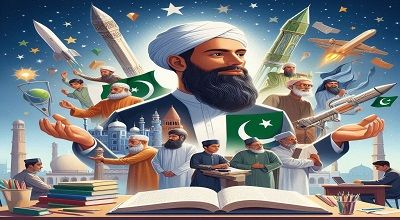Role of Muslim Leaders to Promote Modern Education
Role of Muslim Leaders to Promote Modern Education in Pakistan. Promoting modern education in Pakistan is a vital task that requires the involvement and commitment of various stakeholders. Including Muslim leaders. Here are several roles that Muslim leaders can play in promoting modern education in Pakistan:
- Advocacy for Education: Muslim leaders can use their influence to advocate for the importance of modern education in Islamic teachings. They can emphasize the value of knowledge and the duty of Muslims to seek knowledge.
- Setting an Example: Leading by example, Muslim leaders can encourage their followers to prioritize education. They can demonstrate their commitment to education by supporting schools, colleges, and universities, and by encouraging their own children to pursue higher education.
- Curriculum Development: Muslim leaders can play a role in shaping the curriculum of educational institutions to ensure it aligns with both Islamic values and modern knowledge. They can work with educators to develop a balanced curriculum. That includes both religious and secular subjects.
- Promoting Girls’ Education: Pakistan faces a significant challenge in ensuring equal access to education, particularly for girls. Muslim leaders can advocate for and actively support initiatives that promote girls’ education. They can challenge traditional stereotypes and misconceptions that hinder girls’ access to education.
- Interfaith and Intersectarian Dialogue: Muslim leaders can promote interfaith and intersectarian dialogue to create an atmosphere of tolerance and understanding. This can lead to greater cooperation and harmony in the education sector, fostering a more inclusive and diverse educational environment.
More here…
- Community Engagement: Encouraging community engagement and support for education is crucial. Muslim leaders can organize and participate in community efforts to improve schools, provide scholarships, and create educational opportunities in underserved areas.
- Promoting Technical and Vocational Education: Muslim leaders can highlight the importance of technical and vocational education to address the needs of the job market. They can support programs that offer practical skills and empower youth to become self-sufficient.
- Advocating for Quality Education: Muslim leaders can advocate for improving the quality of education in Pakistan, including infrastructure, teacher training, and the incorporation of modern teaching methods and technology.
- Social Justice and Equity: Promoting modern education also involves addressing social injustices and inequities that affect access to education. Muslim leaders can work to reduce disparities in educational opportunities by supporting policies and initiatives that aim to provide education to marginalized communities.
- Funding and Donations: Muslim leaders and organizations can contribute financially to educational institutions and initiatives. They can establish scholarships, endowments, and educational foundations to support students and schools.
Summary
In summary, the Role of Muslim Leaders to Promote Modern Education in Pakistan. Promoting modern education in Pakistan is a vital task. Muslim leaders in Pakistan can play a significant role in promoting modern education by using their influence to advocate for education, setting an example through their actions, and actively participating in efforts to improve the quality and accessibility of education. Their involvement can help bridge the gap between religious values and the need for modern education, ultimately benefiting the nation as a whole.
